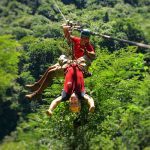Some of our family’s most memorable experiences were on day trips from Isabela Island, in the Galapagos. We were in Isabela Island for only a four short days, but that visit remains one of our favorite travel memories!
The Galapagos Islands, far off the coast of Ecuador, have some of the most unique species on the planet and offer some of best day trips for wildlife watching anywhere. Couple that with beautiful beaches, tropical weather, and friendly locals and you have a destination worth exploring.
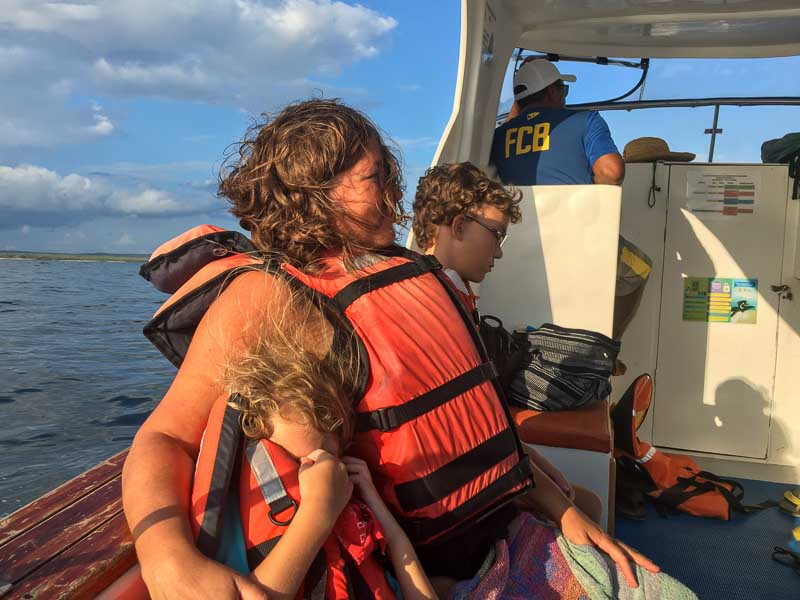
Whether you’re taking a day trip to one of the 18 islands in the volcano-formed archipelago, or hoping to take one of the more luxurious cruise trips to Galapagos Islands, you’re sure to encounter plenty of wildlife.
The Galapagos are home to the endangered giant tortoise, the lava rock loving land iguana and its brethren, the ocean diving marine iguana, plus tons of sea turtles, sea lions and even tropical penguins. The marine iguana is a species of iguana found only on the Galápagos Islands, and is unique among modern lizards in that it finds food under the surface of the ocean.
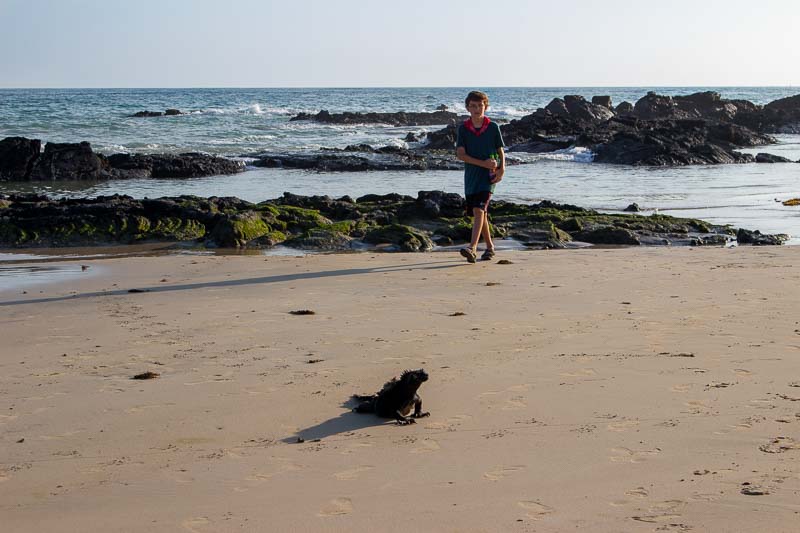
Some of the most scenic day trips you can do in the Galapagos Islands originate from Isabela Island. We had the good fortune of spending some time there and got to experience the best day trips from Isabela Island, Galapagos for ourselves.
A brief history of Isabela Island
Isabela Island (also called Isla Isabela) is the largest of the Galapagos Islands (it’s actually bigger than all the other 17 islands combined!), however Puerto Villamil (the largest village on the island) is the smallest of the three main settlements in the Galapagos.
Getting around town on the sandy streets is quick and easy and there’s a very laid back, almost Caribbean feel to the island. To say that the town is as unique as the people and the animals that live there is an understatement and we met some really nice people there.
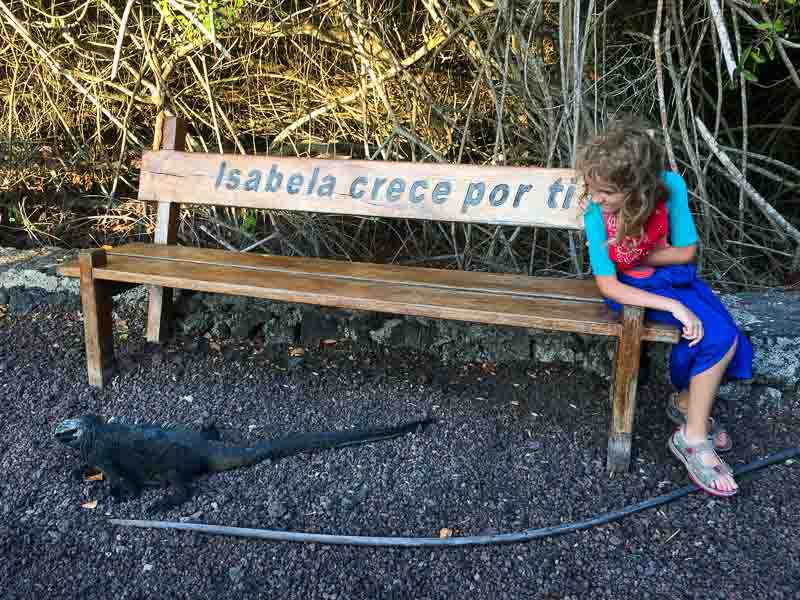
Isabela Island straddles the Equator and was formed, like the others in the archipelago, via lava and volcanoes around a million years ago. As a result, this Galapagos island still has plenty of volcanic activity and ranks among one of the most active volcanic islands in the world. Nearly all the volcanic activity is based around the untouched northern portion of the island but it still makes a for a great trip.
Whether you’re taking one of the many tours or going it alone, there’s a lot to do for such a sleepy place. Like most of the Galapagos Islands, you’ll see sea lions and marine iguanas just about everywhere you look as well as the remarkable frigate birds flying overhead. In the wetlands of the island you can see pink flamingoes and stilts and Darwin’s famed finches, that helped him form his theory of evolution, exist near land and sea.
Under the water you can see some of the largest gatherings of hammerhead sharks in the world as well as plenty of sea turtles, stingrays, manta rays and sea horses. If you’re snorkeling, there’s a good chance you’ll be visited by an inquisitive sea lion and, if you’re lucky, the only tropical penguin in the world, the Galapagos penguin.
Day Trips from Isabela Island
Some of the more notable day trips from Isabela Island include:
A day trip to Los Tuneles
Our favorite day trip from any of the Galapagos Islands, the day trip to Los Tuneles was amazing!
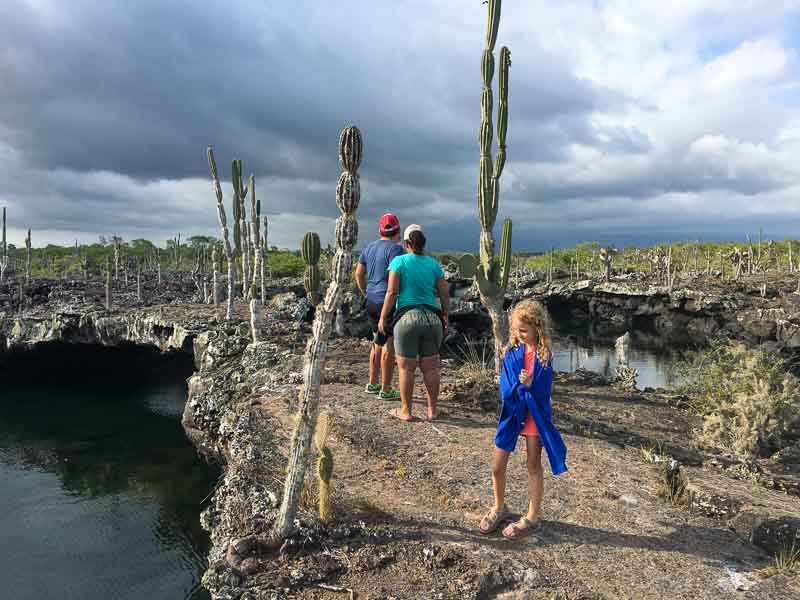
The day we went to Los Tuneles we snorkeled with nearly a dozen sea turtles, swam with reef sharks and sea lions, and also saw a sea horse and a few rays up close.
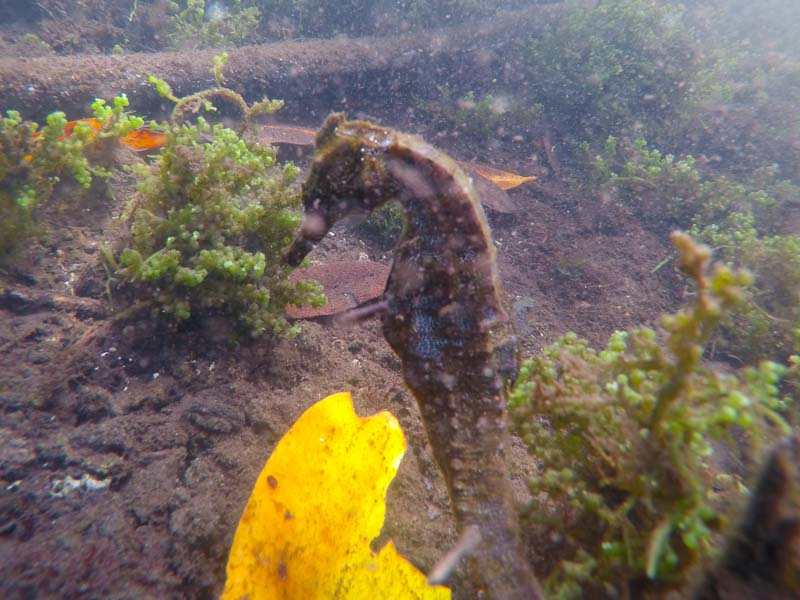
We also walked over crumbling lava tunnels and got up close to watch the mating dance of a pair of blue-footed booby’s.
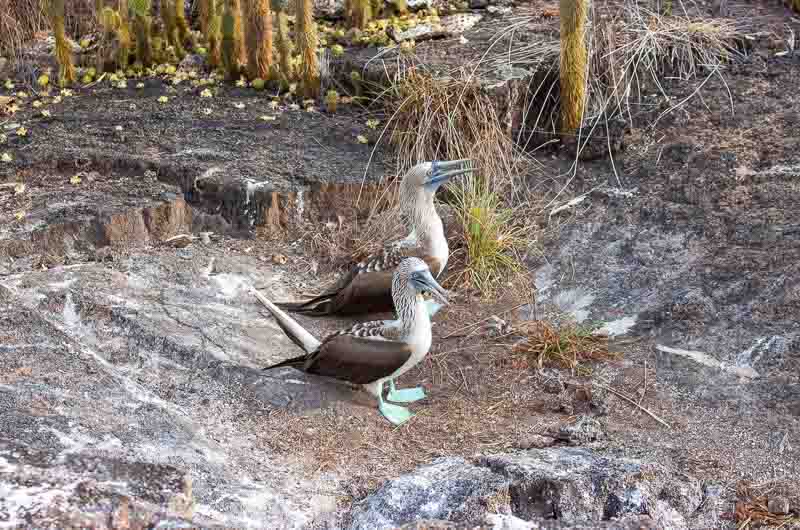
One of my personal highlights was sitting down on one of the caved in lava arches and watching sea turtles navigate the shallow channels of Los Tuneles below to get to the warmer lagoon for the night.
Sometimes they would pass only a few feet away from us and the water was crystal clear.
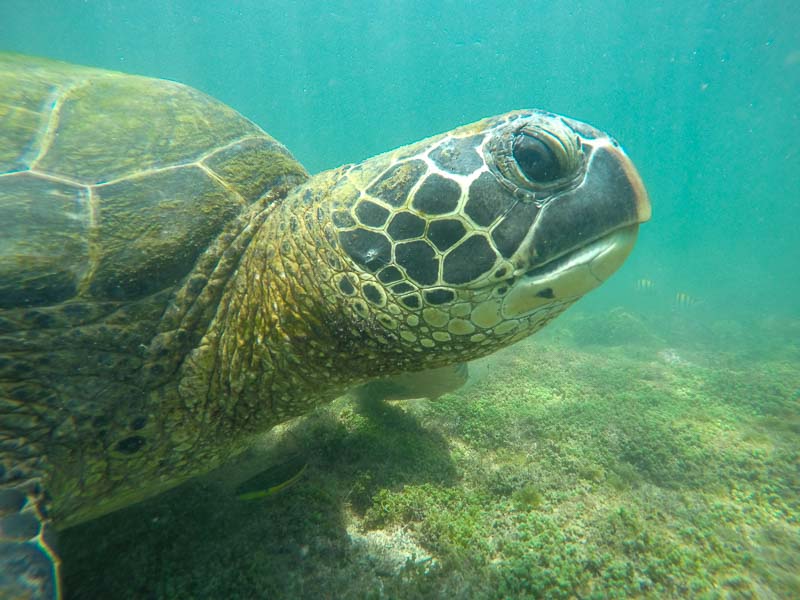
Sierra Negra Volcano
The second largest active volcanic crater in the world, the Sierra Negra is over 10km in diameter. Day trips to Sierra Negra take you up and around the rim and give you spectacular views of the volcano and surrounding islands.
Expect to be hot and tired after your 16 km walk but everyone we talked to who did it said it was worth it for the views alone. It’s about a four to five hour tour that usually includes trips to Volcan Chico which is about an hour farther away where you can see fumaroles (gas vents) and parasitic craters (a non main volcano cone) up close.
Tintoreras
The Tintoreras are a series of small islands directly across from Puerto Villamil.
The tour usually comprises of a small boat that takes five minutes to cross the shallow bay and drives slowly along the coastline so you can see the Galapagos penguins (the only tropical penguin in the world) and blue-footed boobies (funny looking birds with blue feet and an extravagant mating dance) up close.
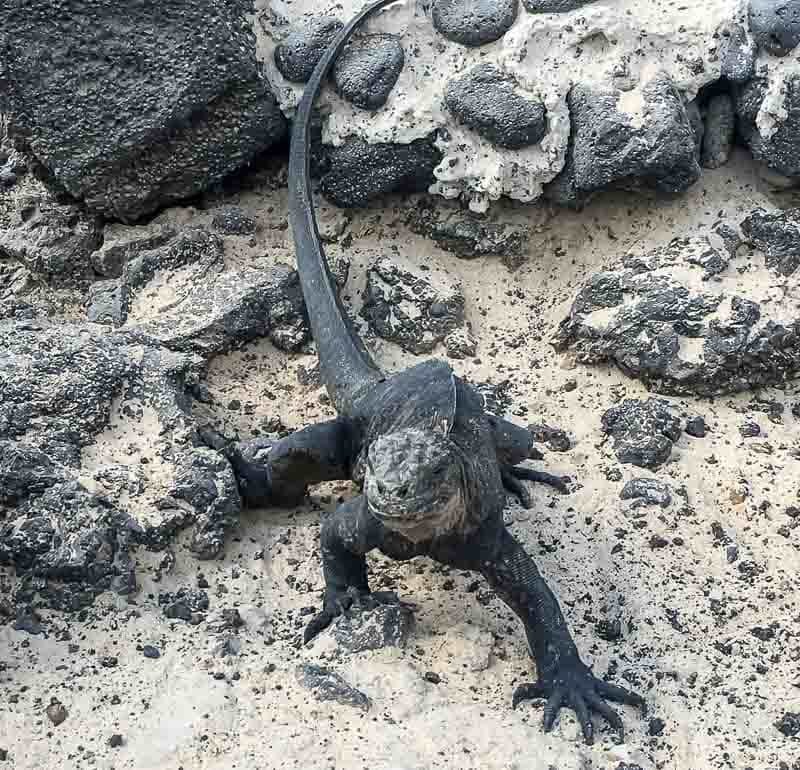
While on a tour, you also have the opportunity to snorkel in between the islands. While snorkeling, you might see everything from small reef sharks to stingrays to sea turtles and curious sea lions.
Once you’re done snorkeling, you’ll cross onto one of the islands where you’ll get off the boat and hike a short trail that’ll bring you to an area full of sea lions and a water alley full of resting sharks.
Tip! If you want you can also kayak over to Tintoreras as part of a group. It’s a fairly similar tour to what’s above however you won’t end up traveling as far down the coast as you would with the boat. The nicest part is that if you find the Galapagos penguins (they move around a lot during certain seasons), you can generally get a little closer to them.
Concha de Perla
The Concha de Perla is like a giant natural swimming pool that’s closed off from the sea. It’s right next to the main island docks. To get to it, look for a sign on the left as you walk towards the water.
After a 1 minute walk along a long wooden boardwalk, you’ll come to a small deck overlooking the bay. There’s not much seating however there are two sets of stairs leading to the water and the Concha de Perla is a gorgeous place to swim and snorkel.
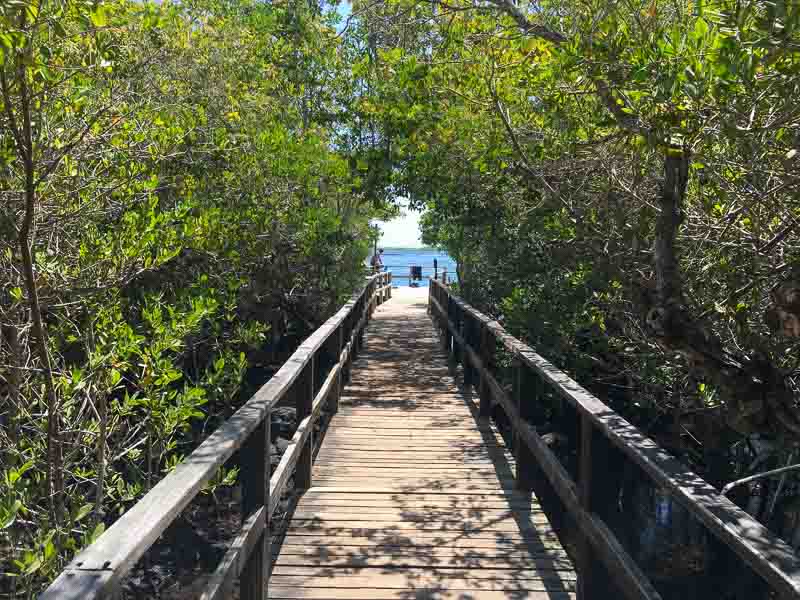
To get to the town docks or the boardwalk, head east from town. The docks can be reached in around 10 minutes. It can be pretty hot in the afternoons so it might be wiser to grab a truck taxi for a few dollars.
Every time we went to Concha de Perla we saw sharks, sea turtles, stingrays and groups of fish. Along the edges, we saw marine iguanas hanging out in low hanging branches just above the water basking in the sun as well as sea lions frolicking about. Supposedly it’s not uncommon to see Galapagos penguins there from time to time as well.
Caution: There is no beach area at Concha de Perla and the water is deep so it’s not great for kids unless they’re strong swimmers. Also note that as the tide rises and drops it can create a current along the outer edges so make sure you’re a strong swimmer or are wearing flippers if you head farther out. Since it’s too deep to see much in the center, you’ll want to keep to the edges anyway.
Giant Tortoise Breeding Center
The National Park runs the giant tortoise breeding center on Isabela Island and that’s where giant tortoises are raised from eggs to adolescence before being set free into the highlands, which is their natural habitat on the island.
The tortoise breeding center is a great place for kids and there is a good interpretation room. To get to it, you can just head down the beach or up the main road the opposite way from the town docks and turn right onto the wooden walkways just past Iguana Crossing. It’s a pretty 30 min walk from town or around 5 minutes by taxi.
Flamingos Lake
To the west of Puerto Villamil, there are various salt and brackish lagoons which house an impressive variety of coastal and sea birds. Here, visitors can also find the largest concentration of flamingos in the Galapagos.
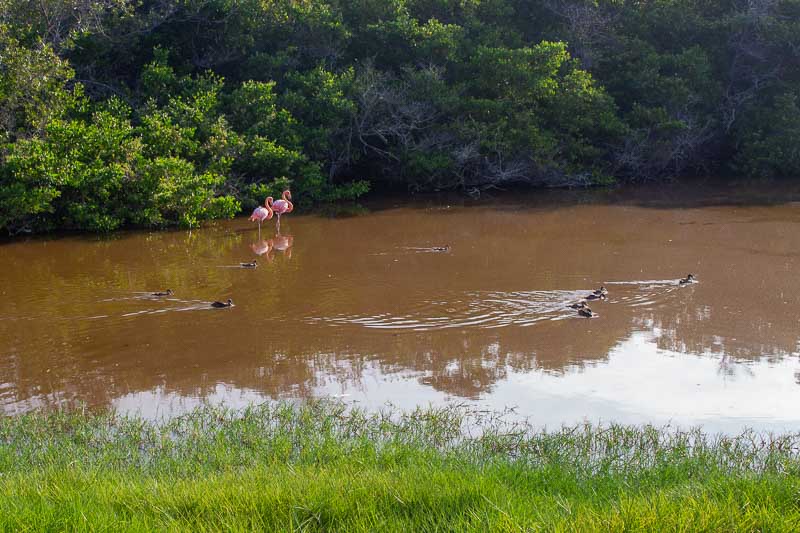
The path to Flamingo Lake is located only a feet from the beach and starts just past Iguana Crossing hotel. You can visit the Tortoise breeding center at the same time since it uses the same path.
Wall of Tears
The Wall of Tears on Isabela Island has a rich history of fairly grisly details. The culmination of which was a large wall made of lava boulders in the middle of nowhere constructed by prisoners in the late 40’s and early 50’s as a large, make work project that never went anywhere.
The Wall of Tears is five km from the town of Puerto Villamil and makes a great early morning or late afternoon jaunt. To get there quicker, you can rent a bicycle in town that will let you ride down the well posted nature trails that will also lead to lagoons, some gorgeous viewpoints, as well as some beautiful secluded beaches.
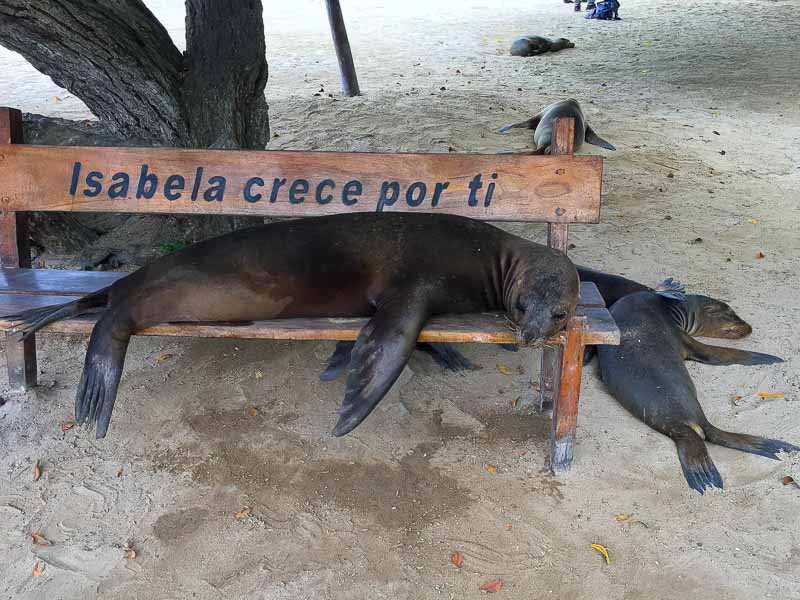
Wetlands
Isabela Island is also home to wetland areas located just outside of Puerto Vilamil. The Wetlands consist of salt water lagoons and mangrove swamps and are home to a variety of unique endemic bird species such as common stilts, whimbrels, white-cheeked pintails, and gallinules. You can visit the Wetlands on foot via a path that winds through the swamps.
You might like:
- Our Experience at Hotel Albemarle on Isabela Island Galapagos
- Lounging with Sea Lions at the Red Mangrove Hotel Galapagos – Our Review
- What To Expect On An Ecuador Amazon Tour With La Selva Lodge
- Why You Need To Visit The Hot Springs At Hotel Termas de Papallacta Ecuador
- Canoeing Into The La Selva Lodge In The Ecuadorian Amazon





